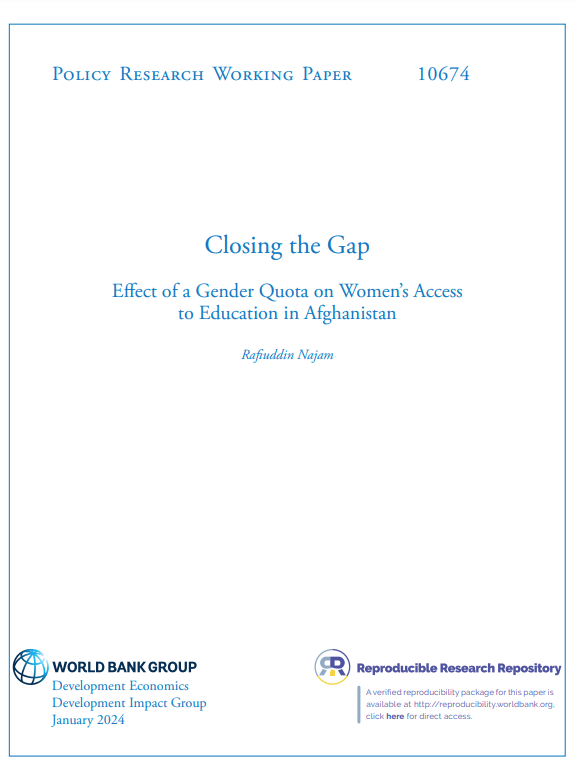Reproducibility package for Closing the gap: Effect of a Gender Quota on Women’s Access to Education in Afghanistan
Overview
Affirmative action is a promising solution to the crucial challenge of bridging the gap in women’s access to higher education in low- and middle-income countries (LMICs). I use public universities’ matriculation data from 2013–2018 and difference-in-differences estimators to examine the causal impact of a gender quota on women’s educational opportunities in Afghanistan. The quota increased the proportion of women in the treated concentration group by nine percentage points and the share of women from low socioeconomic status by three percentage points. The expansion was associated with a 0.04-unit decline in the average score ratio of female-to-male applicants, driven by a reduction in the score threshold needed for women’s admission. The effects were condensed in competitive concentrations, where the overall share of women and women with low SES increased by 17 and four percentage points, respectively. The findings suggest that affirmative action is a viable option for addressing the gender gap in fragile settings.
Reproducibility Package
| Repository name | URI |
|---|---|
| Reproducible Research Repository (World Bank) | https://reproducibility.worldbank.org |
Reproducibility
• OS: Windows 10 Enterprise, version 21H2
• Processor: Intel(R) Xeon(R) CPU E7-4890 v2 @ 2.80GHz 2.80 GHz
• Memory available: 5.9 GB
• Software version: Stata 17
~ 3 minutes runtime
To execute the provided scripts, new users must update the file path specified in the 'Main do' file to correspond with their local environment. Kankor Matriculation data, which is needed for replicating some results, is not included in the published package. Consequently, users will not be able to replicate Table 1 panels E and F and Table B1.1, but the rest of the exhibits are fully reproducible with the provided package. For assistance with the replication process, contact the author at najamr@oregonstate.edu
Data
This study uses data from several sources: raw datasets from the Kankor entrance exams, a comprehensive directory of school records from the Ministry of Education, and district-level nightlight data from the Google Earth Engine. Although the full dataset was used for the analysis, the Kankor data, as well as some intermediate data that combines Kankor and Ministry of Education information, are not included in the replication package due to the license restrictions and increased risk of individual identification. Instructions on how to access the Ministry of Education's data are provided in the README file and the section above. For personalized guidance or additional support with the replication efforts, interested parties can contact the author at najamr@oregonstate.edu, who may provide the full dataset on a case-by-case basis.
Description
| Author | Affiliation | |
|---|---|---|
| Rafiuddin Najam | World Bank, Oregon State University | najamr@oregonstate.edu |
2023-11
Scope and coverage
| Location | Code |
|---|---|
| Afghanistan | AFG |
Disclaimer
The materials in the reproducibility packages are distributed as they were prepared by the staff of the International Bank for Reconstruction and Development/The World Bank. The findings, interpretations, and conclusions expressed in this event do not necessarily reflect the views of the World Bank, the Executive Directors of the World Bank, or the governments they represent. The World Bank does not guarantee the accuracy of the materials included in the reproducibility package.
Access and rights
| Name | URI |
|---|---|
| Modified BSD3 | https://opensource.org/license/bsd-3-clause/ |
Contacts
| Name | Affiliation | |
|---|---|---|
| Rafiuddin Najam | World Bank, Oregon State University | najamr@oregonstate.edu |
| Reproducibility WBG | World Bank | reproducibility@worldbank.org |
Information on metadata
| Name | Abbreviation | Affiliation | Role |
|---|---|---|---|
| Reyes Retana | MRR | World Bank | Junior Data Scientist |
2023-11-16
1
